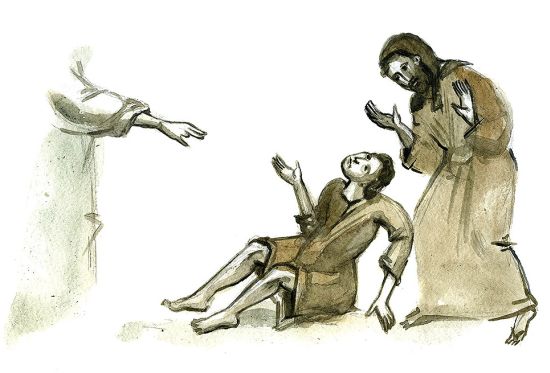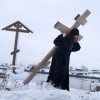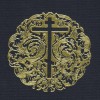“Bring him here to me .. . and the boy was cured that very moment”
(Matt. 17:14-23).
What is life, dear brethren? Behold, a question which is daily before us! Some say that life is eating and drinking, and having a good time. Others would add to eating and drinking, a luxurious, $300,000 home in Beverly Hills. To others, life is constant travel, with its resultant first-hand knowledge of the whole world. Still others associate life with the thrill of sports. We, however, as Orthodox Christians, see life from another viewpoint. For us, life is a road, a continuous procession. The traveler is man. As to where he is going, and what he expects to find on arrival — this can be summed up in one word: salvation. The objective purpose of human existence, then, is salvation. Otherwise, life has no meaning; it is without goal or purpose. Our moral struggle becomes empty and meaningless. The pain and affliction which we encounter every day of our lives is without rhyme or reason. A boat does not remain forever in stormy waters. The day comes at last when it arrives in a calm harbor, there to cast anchor. Yet the journey to the harbor is by no means easy; there are strong winds to be faced and, sometimes, shipwreck. Human life is something like that. Life is not at all easy. God is in heaven, man on earth, and a road of pain and agony lies in between. Many other roads exist, but they do not lead to heaven. “The gate is wide, and the way is broad that leads to destruction, and many are going that way.” There is no harbour at the end of this highway — only chaos, fire, a burning lake, eternal fire, and gnashing of teeth, as the Scriptures warn. On the other hand, the road to heaven is narrow, the gate small, the curves many. Few choose this road. Most prefer the super-highway that leads to hell. The gate to the path of holiness is much too narrow for those who have spent their entire lives feeding their bodies, to the everlasting neglect of their souls. All their lives they cared only to “eat, drink, and be merry, for tomorrow we die.” And die they shall; everlasting denial of the presence of the Most High is the eternal death which awaits them. Some have followed this course through ignorance: “And now, brethren, I know that you acted in ignorance …” (Acts 3:17). Others acted out of frivolity and crass indifference: “I have just bought a piece of land and I must go and look it over … I have just bought five yoke of oxen, and I am on my way to try them … I have just gotten married, and so I cannot come” (Luke 14:18-20). Nevertheless, to all of them apply the hard, yet just, words of Christ: “O you unbelieving and perverted people of the times! How long can I put up with you?” (Matthew 17:17). To all classes and categories of man, to “whosoever will,” Christ addresses His gracious invitation: “Come to me, all of you who toil and carry burdens, and I, yes, I, will lead you into rest. Put on my yoke, and learn from me, for I am gentle and humble in heart, and you will find rest for your souls, for the yoke I offer is easy to wear, and the load I ask is light to bear” (Matthew 11:28-30). We all need Christ. None of us is anything without Him. Were it possible for man to effect his own redemption, without the sacrifice of Christ, His coming and death would have been tragically wasteful. Christ taught that all the good deeds in the world could not bring us one step closer to God. “So you, too, when you’ve done all you were ordered to do, say, ‘We are slaves who claim no credit. We’ve only done our duty’ ” (Luke 17:10). St. Athanasius seeks to drive home the same truth when he writes: “The Word became flesh, in order that we might become acceptable to Divinity. He was incarnate in order to deify us. He became man in order that we might become gods — participants of the Divine nature.” And St. Paul states, perhaps more clearly, “It is God who has delivered us out of the dominion of darkness and has transferred us into the kingdom of His dearly loved Son” (Colossians 1:13). The anguished father who brought his ailing boy to the Savior understood this truth. With great tenderness of heart he addresses to
Christ these simple, yet sincere, words: “Lord, have mercy on my son.”
Indeed, dear brethren, out of all our supplications and entreaties to God, by far the warmest, the most powerful, is the simple Kyrie eleison — Lord have mercy. For this reason our Church repeats this prayer many times at all of her divine services. The words “Lord have mercy” include in themselves the entire human and divine truth. What is man? What is God? What is the relationship between them? “Lord have mercy” is the bridge which unites the two worlds of earth and heaven, human and divine, man and God. In moments of deepest pain, when from the depths of our soul arises the Kyrie eleison, then God inclines His gracious hand to help us; the Almighty Himself enters our human drama with the words, “Bring him here to me.” In those moments when pain and affliction have become our most faithful companions, then let us, dear brothers, lift our eyes to the heavens, and from the depths of our soul let us say, Lord have mercy — Kyrie eleison.
Source: Holy Trinity Orthodox School

















